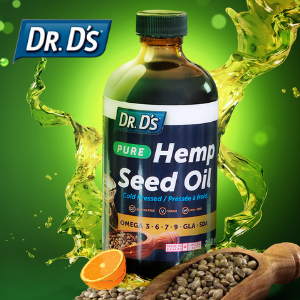
Dr. D’s Hemp Seed Oil FAQ’s
Share
1) Why should I take Dr. D’s Hemp Seed Oil?
Anyone who wants to maintain good health or alleviate symptoms of a chronic condition can benefit from taking Hemp Seed Oil as it provides cardiovascular, neurological, immune and hormonal support. It contains a full spectrum of omegas: omegas 3, 6, 7 & 9 in a perfectly balanced ratio, optimizing therapeutic effects.
2) What is the optimal recommended dosage?
As a maintenance protocol or if you are experiencing mild pain/inflammation, the recommended dosage is 1 tablespoon per day. For people who are experiencing advanced inflammation or have a medical condition, the recommended dosage is 2 tablespoons per day.
3) Should I take it at a certain time every day?
Feel free to take Dr. D’s Hemp Seed Oil at any time of day, with or without meals. Enjoy alone or add it to your favorite soups, salads or shakes!
4) Can I cook with it?
No, as high temperatures will destroy the oil’s nutritious properties.
5) Is it safe to take with my medication(s)?
Yes, however we do recommend that you take Dr. D’s Hemp Seed Oil 1 hour before or after your medication(s).
6) I am already taking Hemp Seeds/Hearts. What’s the difference between the seeds and the oil?
Our seeds are cold pressed to obtain the oil, meaning that they are squeezed at optimal temperatures in order to preserve the omegas. Therefore, the oil extracted from the hemp seeds have a richer omega profile compared to the seeds themselves. Feel free to enjoy your Dr. D’s Hemp Hearts in conjunction with Dr. D’s Hemp Seed Oil as the hearts are packed with protein and fibre.
7) What is the difference between hemp and flax seeds?
Hemp seeds provide more omegas compared to flax seeds. Hemp seeds also do not spoil as easily, provide more balanced omegas, and have a richer profile of essential fatty acids.
8) I am already taking Fish Oil. Should I still take Hemp Seed Oil?
The benefit of Dr. D’s Hemp Seed Oil is that along with providing all of the essential omegas, it is plant-based, free of mercury/toxins, free of gastrointestinal irritation-causing peroxides, does not disturb the eco-system and does not oxidize or spoil as easily as fish oil. Taking Dr. D’s Hemp Seed Oil replaces the need for fish oil supplements.
9) Is this product safe to take while pregnant/breastfeeding?
Yes, this product is safe to take while pregnant/breastfeeding.
10) Can children take this product?
Yes. Dr. D’s Hemp Seed Oil is safe for children over 2 years of age. We recommend one teaspoon a day to maintain good health in children.
11) Are there any side effects of this product?
There has only been one reported case of diarrhea in response to taking this product.
12) Will this product get me “high”?
No. Hemp contains little to no levels of THC or CBD, which are the chemicals that are associated with the psychoactive properties of marijuana.
13) What does it taste like?
Most people describe the taste as “nutty” or “earthy” however we also have our new natural ORANGE flavour which is becoming increasingly popular.

14) Is this product Gluten-Free and/or Vegan?
Yes. Dr. D’s Hemp Seed Oil is not only gluten-free and vegan, but it is also pesticide and herbicide free, and is non-GMO.
15) Where is Dr. D’s Hemp Seed Oil made?
We are proud to say that Dr. D’s Hemp Seed Oil is home-grown, in Peterborough Ontario.
16) Why is Hemp Seed Oil green?
Chlorophyll gives hemp seed oil its green colour. This is an important component of Dr. D’s Hemp Seed Oil as chlorophyll is known to be a natural anti-carcinogenic.
Do you have more questions? Email us at support@doctords.ca